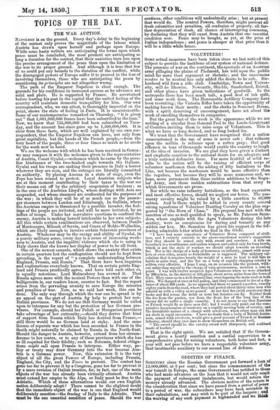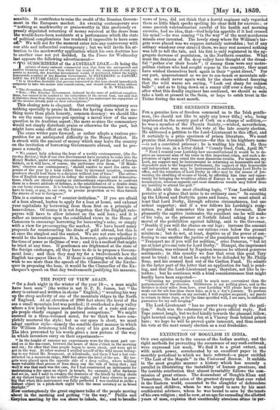ODDITIES OF FINANCE.
SOMETIME since the Russian Government put forward a loan of 12,000,0001. at 3 per cent; but since the commencement of the war tumult in Europe, the same Government has notified to those who had made advances on the loin that it would not only remit the payment of subsequent instalments, but would return the moneys already advanced. The obvious motive of the return is the consideration that since we have passed from a period of peace to a period of war, the subscribers may have been mistaken in their calculations, and may wish to be 9uit of the bargain ; and the waiving of any such payment is lughminded and we think
sensible. It contributes to raise the credit of the Russian Govern- ment in the European market. An evening contemporary sees
" nothing so markworthy or praiseworthy in this previously ex pressly stipulated returning of money received at the doors from the would-have-been assistants at a performance which the state of political complications has rendered it impossible to have come oiE" We will not for the moment enter into any controversy with our able and influential contemporary ; but we will invite his at- tention to the markworthy application which his own doctrine has to another case not yet decided. In the Times for Wednesday
last appears the following advertisement-
" 910 SUBSCRIBERS of the AUSTRIAN LOAN.—It being the 11 opinion of many eminent commercial men that from the unexpected and sudden breaking out of war, from which has resulted the suspension of cash pay- ments in Austria, the Austrian Government would, if petitioned, follow the highly honourable conduct of the Russian Government. by DEFERRING or CANCEL- LING the FUTURE CALLS on account of the above LOAN.
" It is therefore desirable that persons interested in this loan should immediately coilperate to take the matter into consideration, and should without delay address to G. R. WILLIAMS. "The Jerusalem, Cornhill.
"Note.—The Russian Government, induced by the state of political complica- tions, has caused to be notified to the subscribers of the recent loan, not only that it liberates them from future payments, but that it has authorized the repayment of all the monies already paid on their subscriptions."
This closing note is eloquent. Our evening contemporary sees nothing specially to praise in Russia for having done what is no- thing more than plain honesty, common decency : we should like to see the same vigorous pen opening a moral view of the same question in its Austrian aspect ; the more so since the commentary would not simply distribute praise or otherwise for the past, but might have some effect on the future.
The same writer puts forward, or rather adopts a curious pro- position for an anticipated difficulty in the Money Market. He is struck with the amount of money which may leave the country on the invitation of borrowing Governments abroad, and he pro- poses a remedy.
" We cannot help echoing the hope of a weekly contemporary, (the Sa- turday Review,) that if our own Government have occasion to come into the Money Market, under existing circumstances, it will get the start of foreign bidders, as it will have, of course, the preference over them. ' If Minis- ters,' Observes our contemporary, should resolve to meet the extra ex- penses of the year by a loan rather than by increased taxation, common prudence should lead them to a decision without loss of time.' The attrac- tion of English money abroad to defray the warlike doings and demonstra- tions, which are already causing us extraordinary expenditure to confront them in a decent attitude of defence, is the establishment of a double drain On our home resources. It is lending to foreign Governments, that we may have to lend, or pay, to our own, in precise proportion as we thus furnish the sinews of war to foreigners."
This is a curious use of " counter-irritation." If you are afraid of a loan abroad, hasten to apply for a loan at home, and exhaust your capitalists by borrowing from them first on a principle of benevolence. Of course it is not forgotten that the Engligh rate- payers will have to allow interest on the said loan ; and it is rather an innovation upon the established views in the House of Commons to encourage borrowing for borrowing's sake, or simply with a view for preoccupying the market. We have heard many proposals for counteracting the drain of gold abroad, but this is at once the simplest and the easiest. We are not sure whether it would be the least expensive. It is, however, quite as applicable to the time of peace as thetime of war ; and it is a method that might be tried at any time. If gentlemen are frightened at the state of the foreign exchanges, all they have to do is to propose a Govern- ment loan ; and then they may try for a twelvemonth how the Rziglish tax-payer likes it. If there is anything which we should wish to see more than the speech of the Chancellor of the Exche- quer in proposing the loan, it would be the Chancellor of the Ex- chequer's speech on that day twelvemonth justifying his measure.



























 Previous page
Previous page